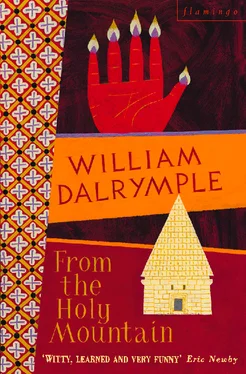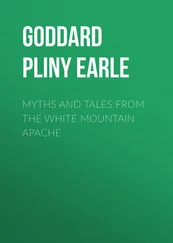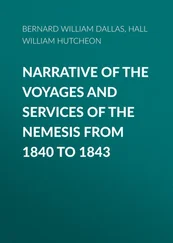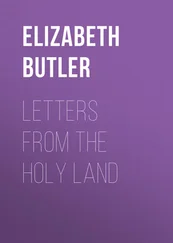‘Can’t you tell the police?’
‘If anyone did the Hezbollah would kill the family … Wait: look!’
Fr. Symeon pointed to a dust cloud now rising on the track from Mardin.
‘More visitors.’
‘It’s the army,’ said Symeon. ‘Two Land-Rovers.’
Below us, Mas’ud had also spotted them and was rushing over to his car.
‘What’s he doing?’ I asked.
‘I think he’s turning his tape machine off. It was playing a Kurdish nationalist song. The soldiers might have arrested him if they heard it.’
The Land-Rovers pulled to a halt by the monastery walls, and armed soldiers began to pour out, some carrying heavy machine guns.
‘My God,’ said Symeon. ‘Is it war?’
But the soldiers did not enter the monastery. Instead they fanned out into the olive groves, jumping over the fence. One soldier kicked down a gate as he passed; another began to throw stones at a pomegranate tree, attempting to dislodge the ripe fruit. Symeon shouted down at them to stop: ‘Use the gate! Don’t break the fence.’
He turned to me: ‘Look at them! Breaking the tree to get at the fruit. Smashing our fencing. This is too much.’
‘Is this all because of my visit?’
‘I fear so,’ said Symeon.
‘I’m sorry,’ I said. ‘I’d better go.’
‘You must go anyway. The sun is beginning to go down. You won’t get to Mar Gabriel unless you leave now.’
We walked down through the cloister to the car.
‘I’m very sorry for all this,’ I said.
‘Just make sure you tell the outside world what is happening here,’ said Symeon. ‘Go quickly now. God be with you.’
Mas’ud pulled away. When I looked behind me I could see the short black-robed figure of Symeon gesticulating at an officer, as the soldiers closed in around him.
The shadows were lengthening into a deep blue slur, spreading softly over the ridges and gullies of the Izlo Mountains. In the narrow river valleys shepherds were leading their flocks through rich groves of fig, walnut and pistachio trees. Women were fetching cooking water from roadside pumps; donkeys with bulging pack-saddles were ambling along the road. It was so easy to forget the troubles: only the continuous gauntlet of checkpoints and the occasional shell of an incinerated vehicle lying abandoned by the roadside reminded one of the dangers that the imminent twilight would bring.
We were making good time. It had just passed 4.30 and we were nearing Midyat, the nearest town to Mar Gabriel. In the distance on the left we could see the church towers of the Christian half of the town, flanked on the right by the minarets of the new Muslim quarter. On the edge of Midyat a large checkpoint had been erected, with a strip of sharpened nails laid out across the road like a fakir’s bed in a cartoon; behind it stood a slalom of oil cans. A line of bored soldiers were sitting in the shade, watching the cars zigzag through the obstacles. We were three quarters of the way through before one of the men – an officious looking conscript with a shaven head – decided to pull us in.
The man asked for our documents. He looked through my passport, pausing suspiciously at one of my Indian visas as if he had just uncovered conclusive evidence of my Kurdish sympathies. He examined Mas’ud’s ID, turning it over with a growing sneer on his face. Then he asked Mas’ud for the documents concerning the car. Mas’ud fumbled around in the glove compartment looking for them. It was clear we were in for trouble.
The conscript chose to take exception to something written on Mas’ud’s driving licence, and spent the next forty-five minutes cross-questioning him. I began to look nervously at the sinking sun and the minute hand on my watch. Eventually Mas’ud passed over a large banknote, folded up in his ID card. The man looked at it, and for an awful five seconds I thought he was about to expose Mas’ud’s attempt to bribe him. But he slipped it into his pocket without his colleagues seeing, and after complaining about the state of Mas’ud’s tyres, let us go. Mas’ud drove away muttering violent Kurdish curses under his breath.
It was now after 5.30. The sun was sinking behind the hills as we headed into the desolate country on the far side of Midyat. The road was now little better than a track; it contained no other traffic and was surrounded by no signs of habitation. There was no noise, no birdsong. It was completely silent; unnervingly so.
It was only when I began to look carefully at the shadowy country through which we were passing that I realised what it was that was so unsettling about it. It was not just barren: it had been deliberately laid waste. The olive groves on the upper slopes were not naturally so twisted and gnarled: someone had actually burned them, so that their skeletons formed a charred and jagged silhouette on the skyline. It was like a Paul Nash picture of Arras or Ypres in 1916. We were passing through scorched earth.
‘The soldiers have done this,’ said Mas’ud.
‘Why?’
‘If they think the PKK are using trees or buildings for cover, the army burns them. It’s partly to hurt the guerrillas, partly to punish the local people for allowing the PKK to use their land. Further east, around Hakkari, whole districts have been laid waste. Many villages have been destroyed.’
Eventually we rose over the crest of a low hill. There was just enough light to distinguish ahead of us the crenellated ghost of Mar Gabriel’s monastery. The huddled buildings stood alone and exposed on a bare and stony hillside, surrounded by a high wall; as we drew near the rising moon silhouetted the cupolas and spires of the churches, and illuminated a tall tower to one side.
A moonwashed gateway rose out of the gloom; and from beyond came the faint but comforting sound of monastic chant. A porter opened the narrow wicket, and as we unloaded our baggage from the car, the monks and nuns began to stream out of vespers. In the lead was the Archbishop; and a little behind him, dressed in a blazer, was a layman. He came up and introduced himself. It was Afrem Budak, to whom I had talked on the telephone. He was welcoming, but clearly also a little angry.
‘You should have been here at least an hour ago,’ he said quietly, shaking his head. He took my rucksack. ‘The risks you take yourself are your business. But you could have got us all into trouble if something had happened to you.’
THE MONASTERY OF MAR GABRIEL, 23 AUGUST
I am sitting outside my cell, under a vine trellis. For the first time I am sleeping in a monastery which John Moschos could have stayed in, hearing the same fifth-century chant sung under the same mosaics. Facing me is the south wall of what is probably the oldest functioning church in Anatolia. It was built by the Emperor Anastasius in 512: before Haghia Sophia, before Ravenna, before Mount Sinai; it was already eighty years old by the time St Augustine landed at Thanet to bring Christianity to Anglo-Saxon England. Yet some parts of the monastery date back even earlier, to the abbey’s original foundation in 397 A.D.
There is only a handful of churches anywhere in the world this old. It is incredible that it has survived at all, but that it has survived intact and still practising when Persians, Arabs, Mongol and Timurid hordes have all come and gone, Constantinople has fallen to the Turks and Asia Minor has been completely cleared of Greeks – this is little short of a miracle.
One of the monks, Brother Yacoub, has just dropped by, and handed me a bunch of grapes freshly picked from the trellis. He is now standing behind me, watching me write. After years of visiting ruined churches across the length of Anatolia, finding these monks wearing almost identical robes to those John Moschos may himself have worn, still inhabiting a building of this antiquity, feels almost as odd as stumbling across a long-lost party of Roman legionaries guarding some remote watchtower on Hadrian’s Wall.
Читать дальше












